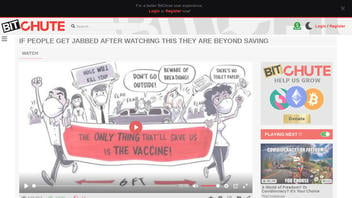
Does a video about COVID-19 present only factual and proven statements about the disease and the COVID-19 vaccines? No, that's not true: It recycles claims that have been disproven and leaves out important context. For example, the video alleges that the vaccines aren't really vaccines, that they're experimental, that certain therapies exist to prevent COVID-19 and that the PCR tests used to detect the virus are basically useless. Expert medical opinion, as well as previous debunks, refute those claims.
The video (archived here) was published on BitChute on May 20, 2021. Titled "If People Get Jabbed After Watching This They Are Beyond Saving," it encouraged people not to get a COVID-19 vaccine. The video included a voiceover, which asked:
Are you getting the vaccine? They say the only thing that'll save us is the vaccine. The government, media and celebrities are using fear to force you into something that you may not be sure about.
Users on social media only saw this title, description and thumbnail:
If People Get Jabbed After Watching This They Are Beyond Saving
Self explanatory. Watch, Share, Mirror Everywhere.
This fact check does not attempt to address all the claims made during the roughly 16-minute video. Instead, we are looking at five of the main allegations, addressing them in the order they appeared.
1. Vaccine safety
First up is the claim that the COVID-19 vaccines are not safe. The video referenced people having severe reactions after getting the shot. At one minute, three seconds, it claims:
The U.S. government's VAERS database is collecting some of the reports. People are having cardiac arrest, respiratory arrest and other severe reactions. You can look up these reports for yourself. This is just a sampling. There are already tens of thousands.
While it's true that there is such a thing as VAERS, short for Vaccine Adverse Event Reporting System, which is collecting reports, the claim is missing important context. Anyone can submit a report to VAERS. The reports are not verified and are not sufficient evidence to establish whether an adverse event, such as a cardiac arrest, was caused by a vaccine. The website for VAERS makes clear the system's uses and limitations. The site reads:
When evaluating data from VAERS, it is important to note that for any reported event, no cause-and-effect relationship has been established. Reports of all possible associations between vaccines and adverse events (possible side effects) are filed in VAERS. Therefore, VAERS collects data on any adverse event following vaccination, be it coincidental or truly caused by a vaccine. The report of an adverse event to VAERS is not documentation that a vaccine caused the event.
Lead Stories has debunked claims that exploit the government's rough reports list before. See here, here and here for those stories. We've also written about how it's statistically inevitable that some people will get sick and die of unrelated causes after getting the COVID-19 vaccine, a caveat not included in the video.
2. Vaccine experimental status
Next up is the claim that COVID-19 vaccines are experimental and not really vaccines. At two minutes, 16 seconds, the video asks:
So why is the injection making people sick? Maybe it's because of what's in those syringes. It's experimental and you're the lab rat. You see, nothing like this has ever been used before. This is not a vaccine.
Neither statement is true.
The COVID-19 vaccines available in the United States are not experimental. They have been authorized for emergency use by the U.S. Food and Drug Administration (FDA). Here's what we've said before about the claim that the COVID-19 vaccines are experimental and here's what the FDA says about them on its website:
The FDA evaluated data from clinical studies that included tens of thousands of people for each COVID-19 vaccine. The FDA authorized the vaccines because the data from these studies clearly showed that the known and potential benefits of the FDA-authorized COVID-19 vaccines outweighed the known and potential risks.
Lead Stories has also previously debunked the claim that the vaccines aren't rightly vaccines. See here for that story. The COVID-19 vaccines clearly meet the definition of "vaccine" set by the U.S. Centers for Disease Control and Prevention (CDC), which can be read here and states that a vaccine "stimulates a person's immune system to produce immunity to a specific disease, protecting the person from that disease."
3. Vaccine effectiveness
At seven minutes, 44 seconds, the video claims the vaccines are not effective:
Ask yourself, if the so-called vaccine was effective, why are they still requiring you to wear a mask after you've been vaccinated? And why have some people gotten COVID after being injected?
No vaccine is 100% effective; however, all of the approved vaccines are effective at preventing COVID-19 and "related serious outcomes, including hospitalization and deaths," according to the FDA. The CDC similarly says that the vaccines will help protect you from getting sick or seriously ill, and may help protect people around you. Mask-wearing reduces the chance that you will inhale some of the airborne virus and breath it out where it will be breathed in by someone who has not been vaccinated.
Also of note: The CDC recently changed its guidance on masks for people who have been fully vaccinated. At the time of writing, May 27, 2021, the CDC says that fully vaccinated people can resume activities without wearing a mask or physically distancing, but still encourages unvaccinated persons to protect against the virus by wearing masks. Read more on that here.
4. Hydroxychloroquine, vitamins and zinc as COVID-19 preventatives
The video recycles the claim that certain drugs and vitamins can prevent and treat COVID-19. At nine minutes, 26 seconds, it claims:
Since they're pushing this experimental injection on us as some sort of an emergency that must mean there are no other safe and effective treatments for COVID-19, right? Wrong. Doctors have found safe, effective and inexpensive treatments that work well in preventing and treating patients with COVID-19, like ivermectin, that's been used safely for more than 30 years.
The video mentions hydroxychloroquine, vitamins D and C and zinc as effective therapies.
Lead Stories has looked into all those treatments before and found claims for their effectiveness lack authority. For example, ivermectin, which is frequently used to treat or prevent parasites in animals, is not approved for treating or preventing COVID-19 in humans. In fact, the FDA specifically warns people not to take it for those reasons. On its website, it says:
The FDA has not reviewed data to support use of ivermectin in COVID-19 patients to treat or to prevent COVID-19; however, some initial research is underway. Taking a drug for an unapproved use can be very dangerous. This is true of ivermectin, too. There's a lot of misinformation around, and you may have heard that it's okay to take large doses of ivermectin. That is wrong.
Similarly, public health authorities have not declared hydroxychloroquine and zinc are a cure for COVID-19, as we noted in this debunk. Th FDA has only approved one antiviral drug called remdesivir (Veklury) and authorized other treatments for emergency use. See here for the FDA's explanation of current options.
5. PCR test accuracy
Last, the video alleges that polymerase chain reaction (PCR) tests for SARS-CoV-2, the virus that causes COVID-19, are basically useless. At 12 minutes, 37 seconds, it says:
In other words, the tests are supposedly finding COVID when there really is no COVID.
The video included a clip of Dr. Anthony Fauci, the nation's top infectious disease expert, talking about the extremely low likelihood of the virus being viable when the cycle threshold is high. His comments were taken out of context to say that tests are not accurate. You can watch the whole video here.
Lead Stories has previously debunked the claim that PCR tests have an accuracy of 0% when more than 35 amplification cycles are used. See here for that story, in which we found that the virus may not be viable and a patient may not be infectious at higher cycle thresholds, but that doesn't mean the patient doesn't have the disease and cannot spread it. The PCR test is the most widely used and trusted test for diagnosing COVID-19.














